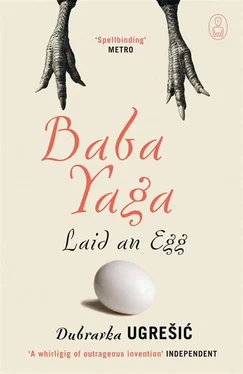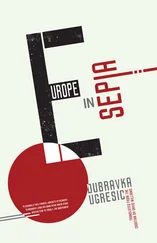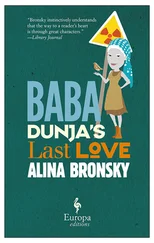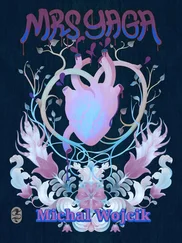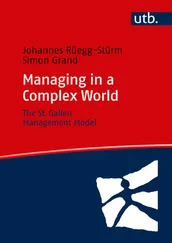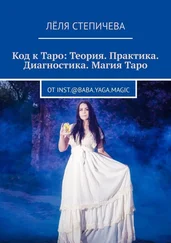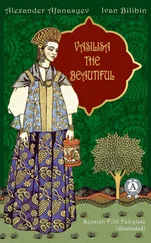‘The little girl came and arrived, came and arrived. The little hut stands still, and Baba Yaga bone leg sits in it, weaving. – “Hello, auntie!” – “Hello, dearie.” – “Mother sent me to borrow a needle and thread to sew up my shirt.” – “Very well, sit yourself down without ado, and weave.”’ (From Baba Yaga )
In the fairytale called Palunko the Fisherman and his Wife , by the Croatian writer Ivana Brlić-Mažuranić, the goddess Dawn-Maiden gives ‘embroidered linen and a pin’ to a faithful wife, and these things save her from misfortune. ‘A white sail arose from the linen, and the pin turned into a ship’s wheel. The wind filled the sail until it bulged like a bonny apple, and the wife grasped the wheel with her horny hand. The wreath around the shuttle broke, the shuttle flashed across the vast sea like a star across the blue heavens! Wonder of wonders, the boat flies from the dreadful pursuer, and the fiercer the hunt, the more it helps: the stronger the gale, the faster the boat runs before it, and the faster the sea, the faster the boat across the sea.’
‘When I go out tomorrow, take care to sweep the yard and the hut, prepare some food, do the laundry, go to the barn and take four ells of wheat and sort it from the cockles. If you don’t do as I say, I’ll eat you up.’
‘I don’t like my rubbish being taken out of my hut, and nosy-parkers get eaten up!’ says Baba Yaga. (From Vassilissa the Beautiful )
Ivan Kupala is a traditional holiday in Russia, Ukraine and Belarus. Celebrated in late June or early July, Ivan Kupala began as a pre-Christian fertility festival to mark the country people’s connection with Dažhbog , the Slavic god of the sun. Rituals involved water (for healing and purification) as well as fire (for light energy).
37 It suffices at this point to remind you of the couplet, quoted above: ‘We move around with silver oars, our vessel is an eggshell’ – meaning Baba Yaga’s mortar or womb, which is the daughter’s and the mother’s at the same time ( stupushka–matushka )!
38 ‘The white bird flew over the white field; it carried white milk in its beak, which it let drip as it flew. The white milk fell onto white stone. This left a trail which bewitched our… [the name of the person who is under a spell should be inserted here]’; ‘Be gone, spell, to the yellow sands, where there are big birds with yellow beaks and grey wings. With their beaks they will tear off, with their wings they will sweep away, and will help… [the name of the person]’; ‘On the white birch-tree, the Nagajbird is sewing up the wounded chest with its beak’; ‘Three brazen-birds, don’t bore holes in the oak, bore out the spells instead.’
I assume that your author’s title, Baba Yaga Laid an Egg , derives from this archetypal image. However, a parallel reading of the title is possible, one that would see the egg as, to put it bluntly, a symbol of (female) creativity. If we pursue the reading in this key, then the picture of female creativity looks rather grim. Female artists are Baba Yagas, isolated, stigmatised, separated from their social surroundings (they live in the woods or on its edge), wholly reliant on their own powers. Their role, just like the role of Baba Yaga in the fairytales, is marginal and constricted. On the other hand, the same title can be read as a cheerful apology for women’s creativity.
Linguistic analysis could lead to a comically grotesque inversion of the phenomenon of female creativity. For every child in Croatia, Serbia and Bosnia knows the nursery rhyme:
Okoš-mokoš
Prdne kokoš
Pita baja
Kol’ko tebi treba jaja?
(Okosh-Mokosh-marting
The black hen is farting
The basket is full, full is the dish
How many eggs do you wish?)
Mokosh, as we know, is the pagan Slavic goddess of fertility ( Mokoš, Makoš, Mat syraja zemlja ). Over time, Mokosh became the guardian of pregnant women and women in childbirth, and under Christianity she gained the name of St Paraskeva or St Petka (meaning ‘Friday’).
In American showbiz jargon, the expression to lay an egg means to fail in a performance – more bluntly, to ‘corpse’ or ‘die’. Presumably your author did not mean to invoke that remote connotation; even so, given that our theme is Baba Yaga in all her ambivalence, it invokes itself.
I have adapted and abbreviated this tale for you. The portions in italics belong to the original.
Once upon a time, a young soldier guarded a demon which, taking pity on it, he released. The demon put the soldier on its wings and carried him off to its castle, where the soldier’s only task was to guard the three beautiful daughters. It was not a difficult service, the young man could have carried on forever, but he noticed that the maidens disappeared somewhere every night. One night he crept into their room and saw the girls stamp their feet on the floor, turn into doves and fly out of the window. The soldier followed suit, turned into a robin redbreast and flew after them, until the doves flew down and alighted in a grove of green trees.
The doves in that place were beyond number; they covered the whole grove. There was a golden throne in the middle of the grove. Time passed, and then heaven and earth flashed, a golden carriage flew through the air pulled by six dragons in harness, with Queen Elena the Wise, whose beauty was beyond imagining, let alone describing.
The youth fell in love with Elena the Wise, mistress of the doves, and he decided to follow her by stealth to her castle. By hiding in a tree, he could keep her chamber in view as he warbled so sweetly and sadly that the queen did not sleep a wink all night. In the morning the queen caught the robin and set him in a golden cage, which she carried into her room. As soon as the queen fell asleep, the robin turned into a fly, flew out of the cage, landed on the floor and turned back into the fine young man. He approached the bed and could not help himself kissing the queen on her honey lips. Then he turned straight back into a fly, went back into the cage and became the robin again. Elena the Wise awoke, looked around, saw no one. She was awoken several times again that night, and in the morning she used her magic book to see everything as plainly as if it was written on her hand.
‘Ah, so it was you, impudent fellow!’ shrieked Elena the Wise. ‘Out of that cage with you! You shall pay for your impudence with your head.’ What else could the little robin redbreast do but fly out of the golden cage, land on the floor and turn back into the good-natured young man? He knelt before the queen and begged her forgiveness. ‘Not for you, knave,’ screamed Elena the Wise, then called for the executioner to cut off the soldier’s head.
At this, the soldier wept and wailed so mournfully that the queen took pity on him: ‘I shall give you ten hours to hide yourself so well that if I cannot find you, you shall have my hand in marriage, but if you don’t succeed, I shall have your head!’
The soldier ran out of the castle and into a thick forest, sat under a bush and despaired. At that moment, the demon appeared before him, stamped on the ground and turned into a grey eagle. The soldier climbed onto the eagle’s back and was borne up to the highest heaven. But Elena the Wise saw all this in her magic book: ‘You fly in vain, eagle, for I see you, and you know full well that you cannot hide from me. Come back to earth!’ What could the eagle do but return to earth? So that is what he does, then he rounds on the young man, strikes him on the face and turns him into a needle, and then himself into a mouse. He picks up the needle in his teeth, slips into the queen’s castle, finds the magic book and thrusts the needle into the book. Elena the Wise searched for the soldier in her book, and she saw him, yes she saw him indeed, but she could not find him. When ten hours had passed, the queen threw the book into the fire in a rage. The needle flew out of the book, hit the floor and turned into the good young man. And that is how they got married.
Читать дальше
